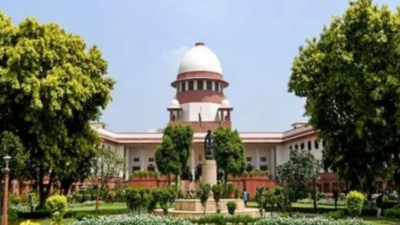NEW DELHI: Can a bus, ship or airplane used for transporting narcotic drugs be seized till the end of trial in the case, the Supreme Court asked on Tuesday while ruling that stringent provisions of Narcotic Drugs and Psychotropic Substances (NDPS) Act does not bar interim release of a vehicle allegedly used for transporting the drugs.
This ruling came from a bench of Justices Sanjay Karol and Manmohan on a petition filed by the owner of a truck which was seized by Assam Police after it was found carrying two soap boxes containing heroin. The owner and the driver of the truck were not named as accused by the police as it named only a passenger in the chargesheeted for carrying the contraband.
The owner pleaded that the truck, bought by him on loan on repayment of EMI of Rs 1 lakh per month, was his only livelihood and that keeping it seized in open ground in a police station is causing damage to it as it was exposed to elements of nature.
Writing the judgment for the bench, Justice Manmohan rejected the plea of Assam that releasing the vehicle could result in its involvement in further drug trafficking and that it should remain seized till the end of trial.
He said, “This Court is further of the opinion that there is no specific bar/restriction under the provisions of the NDPS Act for return of any seized vehicle used for transporting narcotic drug or psychotropic substance in the interim pending disposal of the criminal case.”
Justice Manmohan said, “If the state’s interpretation is accepted, then in a case where an accused is arrested carrying heroin in a private plane or a private bus or a private ship without the knowledge and consent of the management and staff of the private plan or bus or ship, the plane/bus/ship would have to be seized till the trial is over!”
“Though the risk of misuse by the accused or third party of the same plane or bus or ship cannot be ruled out, yet the courts do not take coercive action on the basis of fear or suspicion or hypothetical situation,” he said.
The bench said the police in its chargesheet has not found the owner of the vehicle involved in the drug trafficking and observed that keeping the truck, which is the sole livelihood of the owner, in the police station would lead to its decay.
The bench said in two circumstances – where the vehicle was stolen and used for drug trafficking and where the police seize contraband from a passenger in the vehicle – the seized vehicle could be released on superdari to the owner by the trial courts after putting strict conditions and on furnishing bond that the vehicle would be produced as and when required by the court.
However, it clarified that if after the completion of the trial, the court finds the vehicle should be confiscated, then the owner would have to pay the cost of the vehicle at the time of initial seizure.




